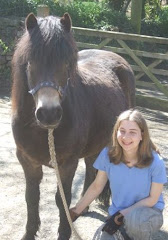 We received excellent feedback for our course "Horse Handling For Beginners" which we ran on 25th June. On this course we cover the fundamentals of handling horses from headcollaring and picking out hooves, to grooming and leading, as well as learning to read basic horse body language. There's just so much to include in a day, we could probably turn this day into a weekend course!
We received excellent feedback for our course "Horse Handling For Beginners" which we ran on 25th June. On this course we cover the fundamentals of handling horses from headcollaring and picking out hooves, to grooming and leading, as well as learning to read basic horse body language. There's just so much to include in a day, we could probably turn this day into a weekend course!We find that beginners pick up techniques and build confidence very quickly - and it's great to send participants out into the world with a good solid foundation of skills to build on. We always emphasise that once people leave our courses, it's really important for them to find some equines to practice with that are suitable for their skill level...it's really important to set yourself up for success!
Course Feedback: We had excellent ratings from participants for the quality of the teaching, the theory content, the practical tuition, the course handouts, the suitability of the ponies, and the overall experience.
"Really enjoyed the teaching style and material. Found as an essential introduction to horse handling".

